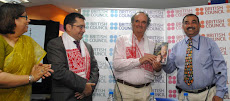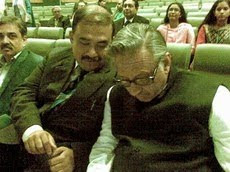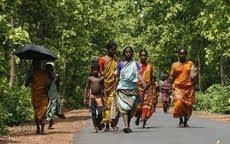Malaysia is a good place to reflect on the great Indian debate about the Partition - more specifically about whether Jinnah was responsible for the Partition that has now been rekindled by BJP leader Jaswant Singh's controversial book. Because as the hour of colonial withdrawal arrived, British Malaya faced a problem very similar to the one we faced in the Indian sub-continent in 1946-47. Whether the Malays, the Chinese and the Indians and other smaller racial groups could stay together in a post-colonial Malaya or whether each community would need their own distinctive homelands -
 that was the million dollar question. While India had to be partitioned because the secular Congress and the pseudo-Islamic Muslim League could not work out a power-sharing arrangement, Malaya remained united because the United Malay National Organisation (UMNO), the Malayan Chinese Association (MCA) and the Malayan Indian Congress (MIC) straightaway worked out a coalition that has survived for sixty years now and still rules the country. So while the Muslim Malays represented in the UMNO had no problems working out coalitions and power sharing arrangements with the minority Chinese and Indians (roughly 40 percent of the population), the predominantly Hindu leadership of the Congress failed to work out something similar with the Muslim League. Primarily because they could not come to terms with the ground realities and stuck to their pretensions that the Congress represented everybody in India.
that was the million dollar question. While India had to be partitioned because the secular Congress and the pseudo-Islamic Muslim League could not work out a power-sharing arrangement, Malaya remained united because the United Malay National Organisation (UMNO), the Malayan Chinese Association (MCA) and the Malayan Indian Congress (MIC) straightaway worked out a coalition that has survived for sixty years now and still rules the country. So while the Muslim Malays represented in the UMNO had no problems working out coalitions and power sharing arrangements with the minority Chinese and Indians (roughly 40 percent of the population), the predominantly Hindu leadership of the Congress failed to work out something similar with the Muslim League. Primarily because they could not come to terms with the ground realities and stuck to their pretensions that the Congress represented everybody in India.At the root of the failure of the Cabinet Mission Plan or other similar efforts to work out a deal between the Congress and the Muslim League was the refusal of the Congress leadership to recognise the fact that the Muslim League had grown in popularity and indeed represented the aspirations of many millions of Muslims in India. The Congress was a secular party and it wanted a complete monopoly of political power, so its leaders would say we represent everybody in India and have no reasons to deal with Muslim League or any other regional party. This stand of the Congress drove parties like Fazlul Haque's Krishak Praja Party in Bengal and Sikander Hayat Khan's Unionist Party in Punjab into the arms of Jinnah and pushed both Bengal and Punjab on the road to partition.
 Sikander Hayat Khan was a Punjabi regionalist and governed Punjab after the 1937 elections through an alliance that included his Muslim-dominated Unionist Party, the Sikh-dominated Akali Dal and the Hindu-dominated Congress. Fazlul Haque was also a Bengali regionalist and his Krishak Praja party, though largely Muslim because Bengal's peasents were mostly Muslim, was more of a socialist party that demanded land rights for tillers of the soil and abolition of zamindari. Both these parties were initially very hostile to Jinnah because they feared his politics would divide the country. The Congress refused to accomodate Haque's Krishak Praja party because the Hindu landowners lobby in the state Congress saw it as a threat to their zamindari. In Punjab, Sikander Hayat finally broke away from the Congress during the Quit India movement because he felt a turbulent transfer of power would divide Punjab. Ironically, the reason for which Sir Sikander came to an understanding with Jinnah - to maintain Punjab's unity - was defeated ultimately in the bloodbath that turned Punjab red with the massacre of millions. All major historians who have studied this period have concluded that the Congress' failure to keep the Unionist Party in Punjab and the Krishak Praja Party in Bengal in its fold started the long road to Partition - because the Muslim League got a mass base in both these provinces when the two regional parties joined hands with Jinnah and supported the Lahore resolution for a separate Pakistan.
Sikander Hayat Khan was a Punjabi regionalist and governed Punjab after the 1937 elections through an alliance that included his Muslim-dominated Unionist Party, the Sikh-dominated Akali Dal and the Hindu-dominated Congress. Fazlul Haque was also a Bengali regionalist and his Krishak Praja party, though largely Muslim because Bengal's peasents were mostly Muslim, was more of a socialist party that demanded land rights for tillers of the soil and abolition of zamindari. Both these parties were initially very hostile to Jinnah because they feared his politics would divide the country. The Congress refused to accomodate Haque's Krishak Praja party because the Hindu landowners lobby in the state Congress saw it as a threat to their zamindari. In Punjab, Sikander Hayat finally broke away from the Congress during the Quit India movement because he felt a turbulent transfer of power would divide Punjab. Ironically, the reason for which Sir Sikander came to an understanding with Jinnah - to maintain Punjab's unity - was defeated ultimately in the bloodbath that turned Punjab red with the massacre of millions. All major historians who have studied this period have concluded that the Congress' failure to keep the Unionist Party in Punjab and the Krishak Praja Party in Bengal in its fold started the long road to Partition - because the Muslim League got a mass base in both these provinces when the two regional parties joined hands with Jinnah and supported the Lahore resolution for a separate Pakistan. So Jaswant Singh has said nothing new in his book. His contention that the Congress rather than Jinnah was more responsible for the Partition has been argued by historians like Sugato Bose, Ayesha Jalal, Joya Chatterji, Suranjan Das, Leonard Gordon and a host of other historians in the last two decade. Joya Chatterji made this point in the most telling manner in her famous work "Hindu Communalism and the Partition of Bengal." But Jaswant Singh is not a historian. He is a scholar who has written other books before and his research is high quality. But he is a BJP leader and it is the apparent mismatch between his political affiliation and the contention of his book that is responsible for the high pitch controversy around Jaswant Singh's book.
So Jaswant Singh has said nothing new in his book. His contention that the Congress rather than Jinnah was more responsible for the Partition has been argued by historians like Sugato Bose, Ayesha Jalal, Joya Chatterji, Suranjan Das, Leonard Gordon and a host of other historians in the last two decade. Joya Chatterji made this point in the most telling manner in her famous work "Hindu Communalism and the Partition of Bengal." But Jaswant Singh is not a historian. He is a scholar who has written other books before and his research is high quality. But he is a BJP leader and it is the apparent mismatch between his political affiliation and the contention of his book that is responsible for the high pitch controversy around Jaswant Singh's book. But I dont see a mismatch between the two. The BJP claims to represent Hindu interests. The Muslim League would represent Muslim interests. If other similar religious parties were around in 1947, India could well have had a Malaya-type ruling coalition. No opposition, all parties co-opted into a ruling coalition and given a share of power.
But I dont see a mismatch between the two. The BJP claims to represent Hindu interests. The Muslim League would represent Muslim interests. If other similar religious parties were around in 1947, India could well have had a Malaya-type ruling coalition. No opposition, all parties co-opted into a ruling coalition and given a share of power.What India needed in 1947 was a platform and not a monolithic, huge party that was uncomfortable sharing powers with others. The trouble , however, was that the Congress itself believed it is a platform rather than a party to back its claim to represent all Indians.
The BJP or its brand of politics thrives on the existence of parties such as Muslim League. They justify each other's existence. That's the political basis for the Malayan model.
Every major community has its own party and the nation is held together by power sharing and accomodation of the interests of the different communities. I call it the "grand coalition model" and Malaysia is the best example of it. The Grand coalition, Barisan National, provides substance to the 1Malaysia (One Malaysia) concept that is represented on huge billboards across Malaysia with a picture of three beautiful children - one Fez topi wearing Malay boy, a Chinese boy dressed in his traditional attire and a Tamil Indian girl (taller than the two) in the centre holding the two boys together. This model recognises ethnic differences and the right of the community to be represented on the democratic platform by its own political organisation.
The model that the Congress pushed in India during the crucial years before Partition - or even for many years after independence - was a one-party, one-platform model that did not work. After a while, iot became a one-leader model. It is only after the Congress weakened in the post-Nehruvian era that it reached out to coalition partners in states, even as small as little Tripura. But in Assam or Mizoram, the Congress has failed to work out power sharing deals with regional parties that grew out of movements and those parties have drifted towards the BJP or worked on their own.The Congress feels these parties can only weaken their hold amongst certain communities - so the reluctance to work out a deal with the UMF in Assam or the Peoples Conference in Mizoram.
 Singapore did break away from Malaysia in 1965 because its majority Chinese population (Chinese are 77 percent of Singapore's population) because the city's rich Chinese elite wanted to leverage their strategic position for global advantage and also distance themselves from the Chinese in Malaya who had supported the Communist insurgency in the 1950s. Singapore is like Taiwan - a fiercely anti-Communist Chinese state but which never shies away from flaunting its Chinese identity. If Singapore remained in Malaya, it would mean two percent more Chinese in a Muslin Malay majority state . That was inconsistent with the ambition of Singapore's ruling Chinese elite . But even after Singapore broke away from Malaysia in 1965, the process was free of acrimony and conflict and relation between Malaysia and Singapore are pleasent. Malaysia has much tensions with its large Muslim neighbour Indonesia - the latest being caused by a extremist group that's planning to invade Malaysia to avenge the "exploitation" of Indonesian expatriate workers in Malaysia.
Singapore did break away from Malaysia in 1965 because its majority Chinese population (Chinese are 77 percent of Singapore's population) because the city's rich Chinese elite wanted to leverage their strategic position for global advantage and also distance themselves from the Chinese in Malaya who had supported the Communist insurgency in the 1950s. Singapore is like Taiwan - a fiercely anti-Communist Chinese state but which never shies away from flaunting its Chinese identity. If Singapore remained in Malaya, it would mean two percent more Chinese in a Muslin Malay majority state . That was inconsistent with the ambition of Singapore's ruling Chinese elite . But even after Singapore broke away from Malaysia in 1965, the process was free of acrimony and conflict and relation between Malaysia and Singapore are pleasent. Malaysia has much tensions with its large Muslim neighbour Indonesia - the latest being caused by a extremist group that's planning to invade Malaysia to avenge the "exploitation" of Indonesian expatriate workers in Malaysia.It is good to have a national party - or rather a few national parties - for a big country like India. But its leadership should understand the limitations caused by India's enormous diversity and realise the need for accomodation. India was partitioned not because HIndus and Muslims felt they could not live together. It was partitioned because the Muslim League and the Congress felt they could not live together and share power. Malaysia's Tunku Adbur Rehman did not write a Discovery of India like Nehru did. He actually discovered the essence of Malaysia and created a strong federation with the help of traditional rulers of fourteen Malay states . There are some who theorise, there are others who excel in practise.
။ Photo : PTI, BBC News, Time, The Hindu and Bengal Newz
( Subir Bhaumik is the BBC's East India Correspondent )







